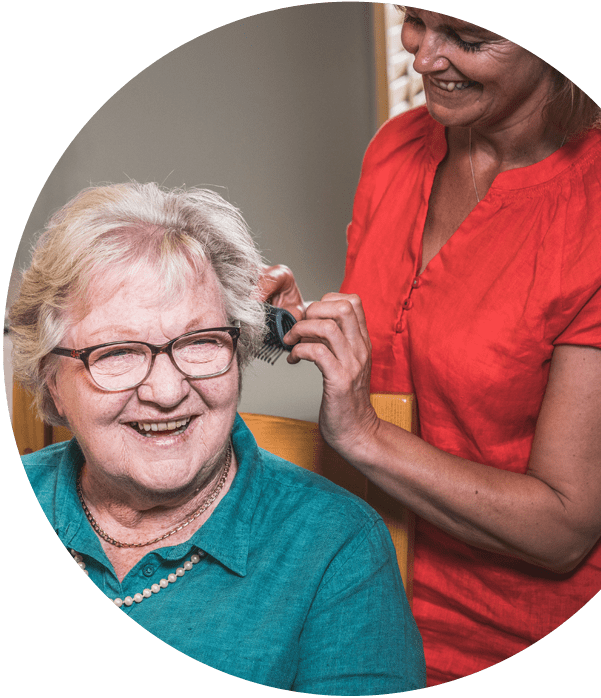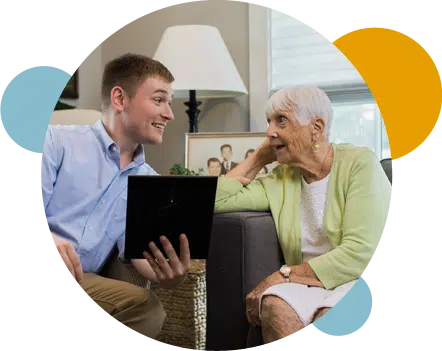Contact us
Please get in touch to arrange your live-in care home assessment.
Familiar surroundings provide much-needed comfort and reassurance
At The Good Care Group, we know receiving care in the comfort, safety and familiarity of your own home has far reaching benefits in improving overall health and wellbeing for a person living with dementia.
Moving at any stage in life can be disruptive and stressful. When an individual is living with the advanced stages of dementia the process of moving to a care home, away from their much-loved home full of its treasured possessions and memories can be really heart-wrenching and daunting, affecting their ability to live well with dementia.
We know that staying at home and receiving compassionate, one-to-one care from a highly trained and well-matched professional carer improves quality of life and health outcomes for an individual living with advanced stages of dementia.
Our personalised approach to providing high-quality dementia care, with a fully managed and flexible service that families can rely on is setting the standards in live-in care.
Advanced symptoms of dementia
As people move through their dementia journey to the advanced stages of dementia, they will experience an increase in their symptoms and are likely to have significant memory loss and cognitive difficulties.
People in the advanced stages of dementia become increasingly frail and depend more on other people for support. As dementia progresses and causes changes to the person's brain, they may struggle to do many of the things they used to.
However, even in the advanced stages the person may experience moments of lucidity (being aware of their situation) and they are always aware of how they are feeling, even if they don’t quite know what made them feel that way.
The person's reactions are likely to be influenced by their environment and how they feel. For example, they may react more positively if they are in a familiar environment or one where they feel comfortable.
People in the advanced stages of dementia often experience problems with the following:
- memory
- concentration, planning and orientation
- communication
- mobility
- eating and weight loss
- toilet problems and incontinence
- changes in behaviour

Memory in the advanced stages of dementia
By the time the person reaches the late stages of dementia, they are likely to have significant memory loss and cognitive difficulties. Recent memories may be lost completely (for example, what they had for breakfast or when they last saw a friend) and they may only be able to access parts of past memories.
The person may believe they are living in an earlier time period from their life (for example, when they were at school). This can mean they say things and behave in ways that do not make sense to those around them. The person may also confuse those around them for someone else (for example, thinking their partner is their mother or father).
The person's emotions are always related to how they're currently seeing their situation - for instance, they might become distressed because they believe they need to go and collect their children from school but they are being prevented from doing this.
The person may no longer be able to recognise themselves in the mirror, or recognise other people such as their partner, friends and family.
The person may become upset when looking at themselves in the mirror or think there are strangers in the house. It can be extremely difficult when someone with advanced stages of dementia is not able to remember their own family or close friends. Don't take this personally. This memory loss is caused by the progression of the dementia.
Even if the person with dementia is not able to place someone they are still likely to experience feelings they associate with that person. For example, they may still be prompted when they see someone familiar to feel safe and happy around them. Keeping in touch with the people they know where possible will help them to continue to have these positive feelings and enjoy their company.
Specialist dementia care at home provided by expert carers
We have been innovating dementia care for over 10 years. All our professional carers are trained in how to care with someone living with advanced stages of dementia and use a range of best practice techniques proven to provide reassurance, reduce anxiety and calm behaviours, whilst reducing the need to use anti-psychotic drugs used widely in many care home settings.
This means the person with dementia can live well, despite the challenges dementia can present, with the gentle encouragement and compassionate care provided by our dementia carers. The high-quality care provided by our dementia carers has seen a 66% reduction in the use of antipsychotic medications compared with the average care home.
Our collaborative approach to working with leading medical experts, academic bodies and leading charities ensure our care is of the very highest standards. Our work with the Contented Dementia Trust to introduce the SPECAL approach helps us to understand and discover what is important to the person living with dementia, enabling us to develop a meaningful programme of care that bridges the gap between the present and the past.
We recognise that feelings become increasingly significant to the person living with dementia, and that intact memories from the past become increasingly useful as a replacement for recent lost facts.
We use the SPECAL approach to:
- Bridge the gap between the person’s past and their activities of daily life in the present.
- Develop communication strategies that enable the person with dementia to communicate in ways which make sense to everyone who has contact with them.
- Promote emotional well-being and protect from anxiety and worry.
We adopt a blended approach to delivery of dementia care at home, led and supported by our own Consultant Admiral Nurse. The support from an Admiral Nurse, working with leading dementia charity, Dementia UK means we can offer unrivalled levels of emotional and practical support based on best practice dementia care to those living with dementia and their families.
All of our professional carers are trained in how to care for those living with dementia and our management team complete a higher-level dementia care training programme. It does not stop there. Our care teams receive on-going coaching, mentoring and support based on latest thinking and research that ensure they have the knowledge, skills and aptitude to deliver positive dementia care.
Meet our experts
Our approach to dementia care at home is developed and led by our in-house team of clinical experts. Working closely with leading dementia charity Dementia UK, uniquely we have our very own full-time Consultant Admiral Nurse, Dr Jane Pritchard. With our in-house Occupational Therapist, Jackie Cooper they both offer practical and emotional support to our clients and their families at what can be a very difficult time. We adopt a multidisciplinary approach to our dementia care service working alongside healthcare professionals to ensure positive outcomes for all our clients. This means they can stay safely and happily at home with the right support and equipment to get the most out of their life.
Personalised care delivered with dignity and respect
Dignity and respect are at the forefront of everything we do and is so important during the advanced stages of the condition. Our highly trained carers work closely with those living with dementia to learn about their past, personality and preferences. Whether it is helping with social activities or simply listening, they take the time to understand the person being cared for and look for ways to enhance their quality of life in a way that respects their choices and preferences.
What does our service include for those with advanced stages of dementia?
Specialist nurse-led care
Importantly for those living with dementia, we are able to provide nurse-led care if and when it is needed. Our professional carers are trained to monitor and identify any changes in your health, responding appropriately and avoiding any unnecessary hospital admissions. As part of our commitment to delivering a high-quality home care service, we monitor and measure health outcomes to ensure we continually improve the care we provide.
Managing and administering medications
Our professional carers are trained in medications management and use an electronic medications system to ensure all medications are managed proactively and effectively. They will also collect prescriptions from the pharmacy.
Ensuring safe mobility in and around the home
Our in-house Occupational Therapist, Jackie Cooper will review of a person’s overall ‘function’ to address how they can safely navigate around their home. She will then provide expert guidance and advice as to what equipment can improve safe movement and mobility around the home, whilst minimising falls. Jackie is well placed to provide advice and recommendations as to any home adaptations that may make life easier. She will continue to review a person’s on-going function to keep them well and safe at home as their cognitive function deteriorates as the condition progresses.
Companionship as and when you need it
Our carers will provide companionship whilst ensuring your privacy is respected. We ensure that a perfectly matched carer shares similar values and interests as you to make life interesting, stimulating and enjoyable, whilst being there for you to support your emotional and psychological needs.
Providing discreet and sensitive personal care
This can include the task-orientated aspects of caring for someone, like bathing and getting dressed, but also those that promote self-esteem, like having your nails maintained, or your hair styled.
Planning and cooking meals
Meals will be planned and cooked according to your choice, preferences and nutritional needs, all served at a time that suits you.
Facilitating social arrangements in the home
Your carer will ensure you can invite friends over for socialisation and celebrations, providing the support you need to enjoy yourself and not worry about organising anything.
Trips and visits out of the home in your local community
Our carers know how important it is to ensure you can continue to do as much you wish and that you remain connected to your local community – whether that is a stroll round the local park or attending clubs or groups in the local area or visiting friends, or those shops you always have.
Domestic tasks
This includes cleaning of all rooms and vacuuming throughout to keep your house to the standards of cleanliness and tidiness you always have.
Caring for your much-loved pet
Carers will happily support looking after your pet, including taking dogs for regular walks.
Our approach to late stages of dementia
Dementia in all forms is a progressive condition and by the time it reaches the advanced stages of dementia it is very likely that you will need round-the-clock support. During this stage the person living with dementia is likely to have become extremely frail, with severe memory loss and may well have trouble with communicating, eating and even swallowing. They may also spend long periods of time inactive and become prone to infections.
Communication is key at this stage. All our carers are trained to have meaningful interactions with those they are caring for when speech is limited – eye contact, gestures or shared experiences all provide ways to make a connection.
Listening to a piece of music together can help someone feel safe, connected and loved.
During late stage dementia more specialist medical care may be needed. At The Good Care Group our care teams are supported by leading clinical experts in the field of dementia care who guide our approach. Carers can draw on the expertise of our in-house Consultant Admiral Nurse, Dr Jane Pritchard and our dedicated Occupational Therapist, Jackie Cooper. Carers proactively use techniques required for safe moving, pre-empting medical issues, identifying infections that reduce medical admission. For many our care is life changing with fewer falls, less infections and reliance on antipsychotic drugs.
Dementia live-in care, short term care or respite care
We provide specialist dementia care at home as either 24 hour live-in care, as a short term care arrangement or as respite care no matter where you are in your dementia journey.
With a full time, live-in care arrangement a professional carer will live with you in your home providing around the clock care and support, focused on improving your health and wellbeing, whilst enhancing the quality of your life. There are many benefits of 24 hour care, not least that the carer will truly get to know you as a person, not just your care needs but they will be on hand to support you to live life the way you wish, with as much independence as possible.
Respite care or a short term arrangement provide an opportunity for a family carer to take a much needed break from caring for someone living with advanced stages of dementia, or for you to try live-in care for the first time to see how live-in care works and whether it is the right choice for you in the future.
Why choose The Good Care Group?
We have been providing high quality, live-in care to families in England and Scotland for over 10 years. At the heart of our award-winning service is enabling people to live independently in their own home with an improved quality of life. Our approach to care at home means our clients can achieve improved health and well-being. For families they benefit from peace of mind and reassurance that their loved on is receiving the very best care and support.
A perfectly matched care team
A live-in care service usually involves two carers working a two-week rotation. They will be carefully matched working with you and your family. We make sure they are skilled and equipped to meet all your care and support needs. Our focus on matching means the care team chosen share common interests and backgrounds. We know this means life is enjoyable for everyone. Your care team really get to know you and your needs, which means you get consistency of care.
Expertly trained carers
All our professional carers are required to complete our leading training programme before they care for our clients. Our programme has been created with leading charities and clinical experts. It goes beyond mandatory requirements in the care sector. Carers are then equipped to provide high-quality care and support for those living with specialist conditions. Our carers never stop learning new skills to further enhance the care they provide.
Continuity of care
Unlike an agency we employ our carers. This means they are committed to us, as we are to them. Carers enjoy the security of being employed, which means they stay with us longer. Those who work for agencies move around more. For families this means that you get continuity and consistency of the same care team caring for your loved one. This means high-quality care can be achieved with improved outcomes and no disruption to your loved one’s life.
In-house clinical experts
We have a dedicated team of in-house clinical experts. This includes a specialist consultant nurse, who also provides Admiral Nurse services to those living with dementia. They guide our carers to provide safe and effective nurse-led care at home. We also have our own in-house Occupational Therapist (OT) who works closely with healthcare professionals and our care teams. Our OT provides guidance and advice that enables people to live well in their own home with any equipment they may need. These experts lead, monitor and support our care teams to delivery best practice nurse-led care at home.
Innovative care technology
Unlike any other live-in care provider, we have our own online care community. Families, healthcare professionals and carers can access up to date information about the care being provided. It enables more effective monitoring, which means issues can be responded to efficiently. For our families it provides a reassuring window into the care their loved one is receiving. Our carers also use the online community to share ideas and support each other. It provides a vital connection which is important when remote working. Carers will use the online community so their clients can enjoy time online. This includes video calls with family, so they feel connected. Clients can use it to shop online or browse the web.
Improving health outcomes
Every decision we make is driven by delivering improved health outcomes for our clients. Our digital technology allows us to predict risk and shape the care we provide. We measure health outcomes.
We want to know we are improving the quality of our clients’ lives every year.
Our health and well-being aim to reduce:
- Behaviours that may challenge
- Antipsychotic drugs in dementia care
- Falls in the home
- Hospital admissions
- Re-admission to hospital
- Urinary tract infections (UTIs)
- Chest infections
- Carer stress
- They aim to promote:
- Independence
- Well-being
- Excellent nutrition and hydration
- Enjoyment in life
Highest service rating from care regulators in England and Scotland
Unlike introduction agencies we are fully regulated in England and Scotland. This means the care and support we provide is regularly inspected. We are the only dedicated live-in care provider in England to achieve an ‘Outstanding’ rating by the Care Quality Commission (CQC). We have achieved this rating in all five measures – safe, effective, caring responsive and well-led. In Scotland, our service has been inspected by the Care Inspectorate (CI). It has achieved the highest rating of a 6 (Excellent) for quality of care and support and 5 (very good) for staffing, management and leadership. We know this provides families with peace of mind that their loved one is receiving the best possible care.
A fully managed service
Families benefit from our fully managed service delivered by care experts. This means you do not need to worry about supervising and managing the carer looking after your loved one. Our professional carers are supervised by an experienced care manager and supported by clinical experts. We provide this support 24 hours a day, 7 days a week. Your dedicated care manager will be on hand to support you, your loved one and our carer teams. We invest in our care management team to ensure they have enough time to give the support everyone needs. With our fully managed service, families do not have the burden of managing the care arrangement themselves. We know this means families can have peace of mind, whilst enjoying quality time with their loved one. They do not have to worry about the tasks of caring.
Local teams with national coverage
We operate throughout England and Scotland with a local approach to management of our teams near you. Each dedicated care manager local to you has only a small number of clients to support. This means they can provide higher levels of monitoring and support than other home care providers. It also means a highly personalised approach to care can be delivered.
What is included in our service?
Our highly personalised dementia care service includes:
- Full assessment before care starts
- Bespoke and flexible care plan developed with input from the family and other healthcare professionals
- Matching of the most suitable care team to meet the holistic needs of our clients
- Dedicated care team led by an expert regional care manager
- Meal planning and household tasks
- Social activities and lifestyle enhancement
- Specialist support and expertise - 24 hours a day, 7 days a week
- Access to clinical expertise and medical support
Costs of our dementia care
The cost of care for people living with dementia is typically in line with – and sometimes less than – what you would pay for residential care, with the added benefit of receiving one-to-one tailored care for the person living with dementia, which cannot be achieved in a care home. There is even greater value if you are a couple and one or both of you are living with dementia. A care home would charge double for two packages of care, whereas there is only a nominal extra cost if you both receive care at home at the same address. Devastatingly for couples, where one of you is living with dementia and the other is not, most care homes would have to separate you to give you the care you need.
The cost of receiving care at home is typically higher for those living with dementia and other neurological conditions as it is a specialist care at home service. It is worth considering however that live-in care is often cheaper than the total cost of domiciliary care for people living with dementia. When a person is receiving hourly care, provided by a domiciliary care provider it is likely that you will be charged extras for additional services to support the person’s dementia needs on top of the cost of a carer visiting. These extras add up and can become costly over time. The total cost to provide hourly care to someone living with high or complex needs can sometimes exceed the price of an inclusive live-in care service.
Useful resources
To support you and your family we have created a useful Dementia Care Guide which provides you with information and advice on how to provide person-centred dementia care following a diagnosis of dementia. There is also a number of dementia charities across the UK who provide families with help, advice and support when they need it most, including Dementia UK and the Alzheimer’s Society.
View more about our dementia care services
Other conditions we care for
Talk to us about your dementia care needs
Our friendly and experienced team is here to help you and your family make sense of the options available to you. Call us today – we will help you every step of the way.



